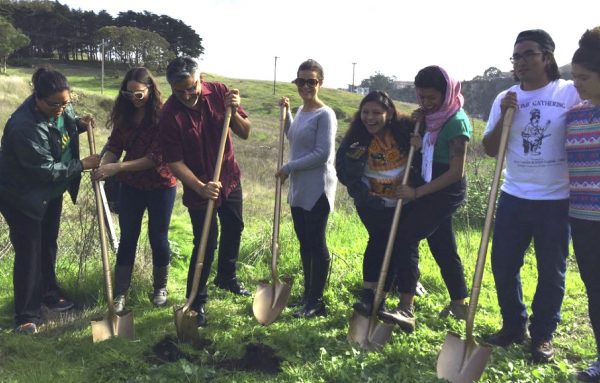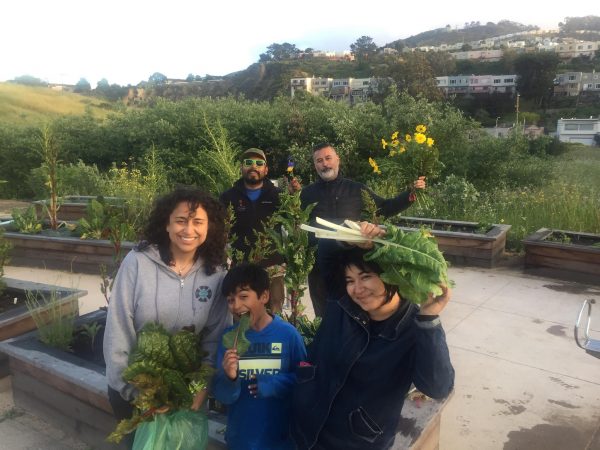

Members of Urban Campesinx, part of a program run by People Organized to Demand Environmental and Economic Rights (PODER). (Photo courtesy of Antonio Díaz)
Alondra Aragon is a busy new mother who is not afraid to get her hands dirty helping her community. With her thirteen-month-old son by her side, she tends traditional crops like corn and beans at Hummingbird Farm in San Francisco’s Excelsior neighborhood. Alondra is an Urban Campesinx, part of a program run by People Organized to Demand Environmental and Economic Rights (PODER) that connects young people of color living in the city’s most polluted areas to agricultural traditions, healthy foods, and green ideas. Alondra and the youth workers at the farm are some of the most committed environmentalists around, rolling up their sleeves to create real solutions that are rooted in the community.


Alondra and her thirteen-month-old son. (Photo courtesy of Antonio Díaz)
The June election, which brought the defeat of Proposition 70, is proof that people of color like Alondra are leading the way in California when it comes to forward-thinking, equitable solutions to climate change. Proposition 70 is a ballot initiative that favored corporate interests in California’s climate policy. People of color are now the majority in California, and as the defeat of Proposition 70 shows, they demand that our leaders stand strong against Big Oil lobbyists.
Backroom Deals with the Oil Industry Must End
Earlier this year, the California Environmental Justice Alliance (CEJA) released our fifth annual Environmental Justice Scorecard for the 2017 legislative session. The Bay Area Caucus’ scorecard rank is slipping in part because lawmakers struck a deal with Big Oil to extend California’s cap-and-trade program, forcing Proposition 70 onto the June 2018 ballot.
If voters had approved Prop. 70, it would have jeopardized millions of dollars of funding that now support solar panels, affordable housing, zero-emission buses, and other climate change projects that promote clean air and good job opportunities. These projects have directly benefited low-income communities of color statewide. Fortunately, voters rejected this brazen, corporate-led attack on the state’s climate and clean air programs. But the threat remains, and this coziness with the state’s biggest polluters must end.
Behind California’s Eco-Conscious Brand, Policies Need a Revamp
Our region has a reputation for national and even global leadership on environmental issues, but in recent years it seems California’s eco-conscious brand is more about image than impact. Despite California Gov. Jerry Brown’s high-profile platitudes at global climate summits, California is still one of the top oil-producing states in the country. Meanwhile, fossil fuel pollution has actually increased under the California carbon trading scheme. This has deadly consequences for residents of the low-income neighborhoods and communities of color who live near our 19 oil refineries. Despite California’s clean transportation policies, the Excelsior still has the highest rates of childhood asthma in our region due to nearby freeways.
Communities of color and low-income leaders led the successful fight to nix Prop 70. Its resounding defeat should be seen as yet one more indication that while communities of color bear the brunt of pollution and climate impacts, they are also at the forefront of solutions. From the Excelsior to South Los Angeles, people of color are pushing California leaders to ensure environmental policies deliver benefits that reach the most impacted communities.
The Bay Area can lead a bold agenda for climate justice: it starts with keeping fossil fuels in the ground, clearing the air of smog and other harmful pollutants, making corporations pay for pollution and its impact on our climate, and keeping our kids healthy by eliminating toxins from the places they live, learn, and play.
Global Climate Action Summit Just Around the Corner
Bay Area lawmakers will have a unique opportunity to elevate these environmental justice solutions at the upcoming Global Climate Action Summit in San Francisco in September. Alondra and the Urban Campesinx are ready to show world leaders how agro-ecology and cooperative stewardship of public lands can cool the planet, feed the people, and reconnect the community. Will our lawmakers step up?


Urban Campesinx members. (Photo courtesy of Antonio Díaz)
Environmental justice is about stopping harm to communities of color while transitioning to healthy, local, living economies. Ramping up renewable energy, enriching our topsoil, protecting our drinking water, and ensuring affordable neighborhoods free from air pollution – these are the solutions we need elected officials to support.
As Alondra says: “Being part of Urban Campesinx is teaching me to thrive.” Elected officials must step up to ensure a thriving future, getting their hands dirty to do the hard work of systemic change. For Alondra and her son, environmental justice commitments from our next governor and our state lawmakers would be a breath of fresh air.
***
Antonio Díaz is the director of PODER (People Organized to Demand Environmental and Economic Rights) and serves on the board of CEJA, the California Environmental Justice Alliance.


